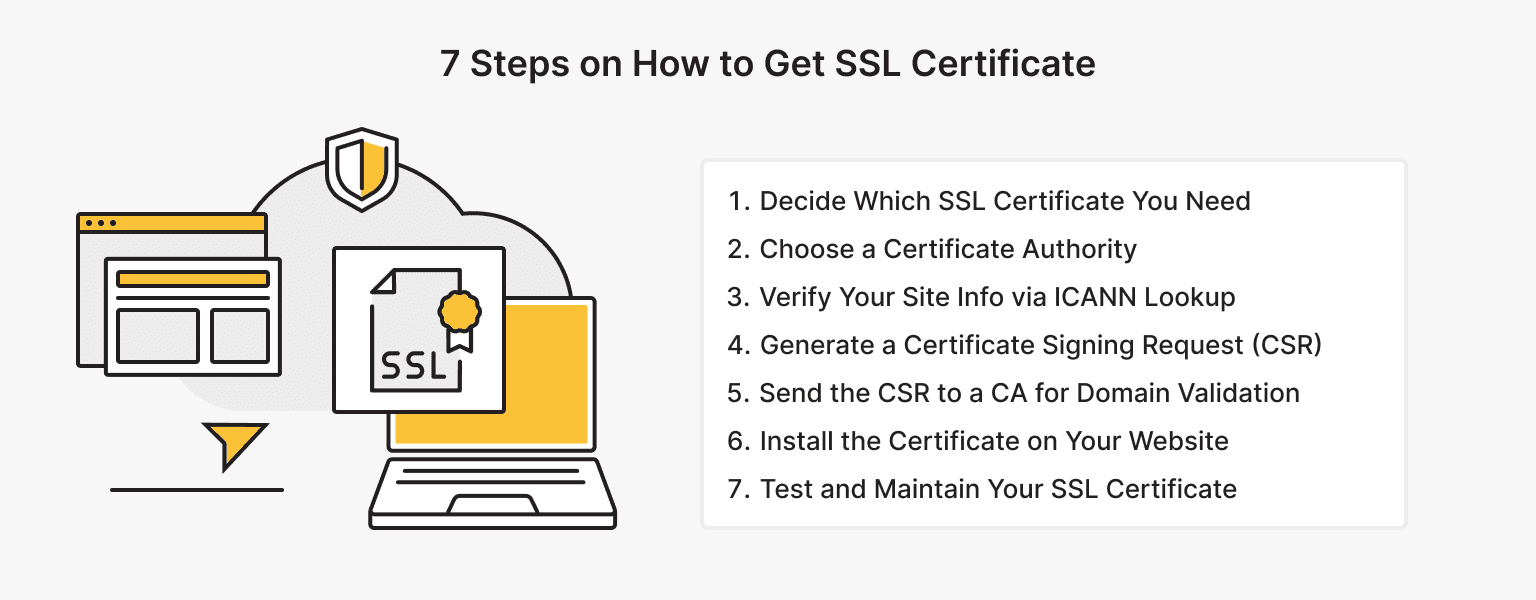
- What Is an SSL Certificate?
- How SSL Certificates Work
- 7 Steps to Getting an SSL Certificate
- Decide Which SSL Certificate You Need
- Choose a Certificate Authority
- Verify Your Site Information Through ICANN Lookup
- Generate a Certificate Signing Request (CSR)
- Send the CSR to a Certificate Authority to Validate Your Domain
- Install the Certificate on Your Website
- Test and Maintain Your SSL Certificate
- What is a TLS Certificate?
- Conclusion
Your website is your online presence, and it's important that it looks (and is!) professional, secure, and trustworthy. One of the best ways to gain the trust of your website visitors is to obtain a Secure Sockets Layer (SSL) certificate. This certificate creates an encrypted connection that keeps all information submitted by users of your site safe and secure.
An SSL Certificate is not just a fad — if you don't have one, your browser will definitely let people know that your site is not secure. In some cases, potential customers won't even be able to open your site.
In this article, we’ll tell you how to get an SSL Certificate in a simple and accessible way. We promise it’ll be easy!
What Is an SSL Certificate?
An SSL certificate is a digital certificate that helps ensure a secure online experience for website users. It authenticates the website and encrypts data transmitted between the website and the user's browser. It is the certificate that keeps user information private and secure, meaning that it cannot be eavesdropped on or tampered with.
SSL certificate is also used to authenticate websites, so your customers can be sure they are connecting to a legitimate site, not a fraudulent one. Certificates like these show search engines like Google that your site is secure, which can significantly increase its visibility. How do I optimize my site for voice search?
Types of SSL Certificates

There are several ways to classify SSL certificates, each with its own set of features and purposes. We can classify certificates according to the following characteristics.
By Verification Level
SSL certificates can be classified according to the depth of domain and organizational verification.
- Domain Validation (DV) certificates: verify the ownership of a domain name but do not require extensive authentication. They are usually issued quickly and are suitable for personal websites or blogs.
- Organization Validation (OV) certificates: validate a domain name and its associated organization. They require some level of activity verification and display the organization name in the certificate details.
- Extended Validation (EV) certificates: provide the highest level of verification. They perform a thorough authentication, including legal and operational checks. EV certificates display a green address bar and organization name, a strong visual sign of trustworthiness.
By the number of protected domains
SSL certificates are also categorized by the number of domains they protect.
- Single-domain certificates: protect a single domain name.
- Multi-domain certificates (UCC/SAN): protect multiple domain names within a single certificate.
- Wildcard certificates: can protect an unlimited number of subdomains within a single domain name.
By encryption algorithm
This is a less common classification of SSL certificates.
- RSA (Rivest-Shamir-Adleman) certificates: use the RSA algorithm for encryption and decryption, which is based on the principle of simple factorization.
- ECC (Elliptic Curve Cryptography) certificates: use elliptic curve cryptography, which provides stronger security with a smaller key size.
In general, when selecting a certificate for a website, you can limit yourself to classifications by validation level and number of domains. Choosing a specific type of certificate becomes obvious because you can determine the size of your own organization and the number of domains that need to be protected.
Get the most out of your budget with our affordable, efficient VPS solutions. Fast NVMe, 30+ countries, managed and unmanaged VPS.
How SSL Certificates Work
SSL certificate establishes a secure connection between a website and a user's browser using cryptographic processes and protocols.
- Public key exchange (handshake). When a user visits a website secured by an SSL certificate, the web server sends its public key to the user's browser. The browser then verifies its authenticity with a Certificate Authority.
- Session key generation. The user's browser generates a random temporary session key using a secure cryptographic algorithm. The session key is used to encrypt and decrypt data during the user's session on the website.
- Session key encryption. The user's browser encrypts the session key using a public key obtained from the web server. The encrypted session key is sent back to the web server along with other necessary information.
- Session key decryption. The web server uses its private key to decrypt the encrypted session key. Only the web server has access to the private key, ensuring secure decryption of the session key.
- Secure communication. Once the session key is decrypted, the web server and the user's browser establish a secure, encrypted communication channel. All data transmitted between the browser and web server during a session is encrypted with the session key. This encryption prevents sensitive information from being overheard, tampered with, or intercepted.
For ease of understanding, the SSL certificate creates communication between the browser and the website server can be divided into two steps: SSL confirmation (described above) and the actual transfer of data over the encrypted communication channel. When the connection is secure, the browser displays a closed padlock icon and "https://" in the address bar.
7 Steps to Getting an SSL Certificate

Even if you don't receive or transmit sensitive information, having an SSL certificate is a must. Let's take a step-by-step look at how to buy an SSL certificate for your site.
Decide Which SSL Certificate You Need
Which type of SSL certificate is right for you? It depends on several factors and the specifics of your business.
For example, let's take a one-page site that provides information about the location and hours of a business or details about an event. For this site, domain validation may be sufficient because it provides simple information and does not collect specific user data.
For an e-commerce site that is hosted on a scalable VPS or dedicated server, where users exchange personal information such as e-mail addresses, passwords, shipping addresses, and credit card details with the web server, advanced verification should provide a higher level of security and trust. In addition, an online store may collect customer data for use in marketing campaigns, making it more suitable for advanced verification.
In addition to the specifics of your business, consider the cost of the certificate, which will vary depending on the complexity and specific type.
Choose a Certificate Authority
A Certificate Authority is an organization that issues SSL certificates. There are dozens of Certificate Authorities around the world, but a few of them own most of the global SSL market. Some offer free SSL certificates.
The following Certificate Authorities are among the best:
- Sectigo (formerly Comodo) is the market leader in commercial Certificate Authorities. This center has achieved significant success in recent years due to its affordable pricing. Despite the fact that verification can take some time, Sectigo certificates are very popular.
- DigiCert offers complete encryption and anti-malware solutions for enterprises. All of their certificates include dynamic site printing, additional protection for user data and critical site infrastructure, and fast Business or Extended Validation.
- SSL For Free is a non-profit Certificate Authority that works with all major browsers. Like other free SSL Certificate Authorities, SSL For Free offers free SSL certificates that are valid for three months at a time. As the domain owner, you must renew every three months at no charge.
- Let's Encrypt, created by the Linux Foundation, also offers free SSL certificates that must be renewed every 3 months. This center has a long-term goal of moving the Internet from HTTP to HTTPS.
Other popular options include Cloudfare, GeoTrust, Thawte, GoGetSSL, and others. We recommend that you familiarize yourself with the pricing and benefits of each certification center. Then you can make an informed decision about choosing one or the other.
Verify Your Site Information Through ICANN Lookup
Before you apply for an SSL certificate, make sure your information matches ICANN's search records. Check your server name, registrar information, and authoritative servers.
The ICANN tool uses the Registry Data Access Protocol (RDAP), created by the Internet Engineering Task Force (IETF) technical community as a replacement for the WHOIS protocol (port 43).
Save the information from the service and update it, if necessary, in the Certificate Signing Request (discussed below).
The ideal solution for large projects. Impeccable protection, high performance and flexible settings.
Generate a Certificate Signing Request (CSR)
A Certificate Signing Request (CSR) is a file that must be created on your web server before you request an SSL certificate from a Certificate Authority. After your request is processed, the CA uses the information in this file to issue an SSL certificate.
You can generate the Certificate Signing Request code yourself: for example, if you manage your own hosting server. The best way to do this is to contact your hosting provider's technical support, which can tell you how to generate an accurate CSR.
Send the CSR to a Certificate Authority to Validate Your Domain
Now that you have generated the CSR, the next step is to go to the Certificate Authority website of your choice and purchase the type of SSL certificate you need. After you complete the purchase process, the CA will ask you to submit the CSR file you generated in the previous step.
Depending on the type of SSL certificate you purchase, it may take anywhere from a few hours to a few days for the Certificate Authority to verify your information and issue an SSL certificate for your site.
Install the Certificate on Your Website
Once the Certificate Authority has processed your SSL certificate request, you will receive an email that will allow you to access the SSL certificate. Alternatively, you can download it from the user account you created when you purchased the certificate.
The SSL certificate installation process varies depending on the operating system of the server hosting your website.
Our knowledge base has several tutorials to help you install an SSL certificate.
Test and Maintain Your SSL Certificate
It is recommended that website owners regularly check their SSL certificate and schedule maintenance. This will give you peace of mind and ensure that your certificate does not fail or expire without your knowledge.
Many certificates are valid for 12 months, and some (such as free SSL certificates) are valid for 3 months. Check the specific details of how your certificate works so you don't miss the expiration date.
The most common practice is to set up an email notification to alert you when your SSL certificate is about to expire.
Remember that the protection of your site users' information depends on how your SSL certificate works. This will prevent many security problems.
What is a TLS Certificate?

SSL supports older algorithms that still have some vulnerabilities, and SSL handshakes are complex and time-consuming. By contrast, TLS (Transport Layer Security) uses more advanced encryption algorithms, where the TLS handshake is simplified and allows for faster connection establishment.
The TLS protocol is based on the SSL version 3.0 protocol specification. This security protocol allows client-server applications to communicate over a network in a way that makes packet sniffing and unauthorized access impossible.
Despite the fact that TLS is a more modern version of SSL and that both public versions of SSL have known vulnerabilities, certificates are still referred to as SSL.
Why is this happening? It's not that sites are still using an outdated version of certificates. It's just that the name has become so popular that it hasn't changed. In reality, all SSL certificates in common use are SSL/TLS Certificates.
There is no such thing as just an SSL certificate or just a TLS certificate, and you don't have to worry about replacing one with the other. You just use them in order to ensure a secure connection.
Conclusion
Getting an SSL Certificate for your website increases its authority and users' trust, as well as helping with search engine optimization. It is easy to get one through trusted Certificate Authorities.
By following the steps outlined in this article, you can protect your site with an SSL certificate. Once it's installed, visitors will see a padlock icon and "https://" in the address bar, which means their connection is encrypted and data is being transmitted securely.
We also remind you to renew your SSL certificates before it expires to keep your site secure.
If you're just getting started with building your own website, we suggest you choose a hosting service that's right for you. Free services can be risky in terms of security and scalability. The best bet is to buy VPS server for your site. This type of hosting gives you the flexibility you need as your business grows, and it's affordable for any budget.
VPS for your website
Choose the suitable configuration and enjoy all the benefits of a virtual private server.
From $5.00/mo- What Is an SSL Certificate?
- How SSL Certificates Work
- 7 Steps to Getting an SSL Certificate
- Decide Which SSL Certificate You Need
- Choose a Certificate Authority
- Verify Your Site Information Through ICANN Lookup
- Generate a Certificate Signing Request (CSR)
- Send the CSR to a Certificate Authority to Validate Your Domain
- Install the Certificate on Your Website
- Test and Maintain Your SSL Certificate
- What is a TLS Certificate?
- Conclusion


